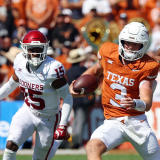Clemson coach Dabo Swinney has joined the discussion on race relations in the United States.
By itself, that's a good thing, especially since he's a prominent coach at a nationally recognized program and has a platform many others do not. That Swinney has an overwhelmingly positive and simplified outlook on that topic is well-intended but missing on a few marks.
In a 10-minute speech during his weekly press conference, which you can watch below, Swinney shared his opinion on Colin Kaepernick's protest. The easiest way to summarize: Swinney, who is devoutly Christian, feels there is a "sin" problem but not a racial one.
Swinney deserves credit for this much: He spent 10 minutes talking about a socially relevant topic. That's about nine minutes and 30 seconds more than most coaches would, assuming they're not awkwardly filibustering their stance with "uhs" and repetitive rhetoric. Jim Harbaugh -- who, of all people, coached Kaepernick at San Francisco -- offered nothing more than a brief statement: "I acknowledge his [Kaepernick's] right to do that, but I don't respect the motivation or the action." He was later forced to clarify this.
I apologize for misspeaking my true sentiments. To clarify, I support Colin's motivation. It's his method of action that I take exception to
— Coach Harbaugh (@CoachJim4UM) August 29, 2016
But for Swinney to say this country has a sin problem, not a racial one ... for him to claim there's a certain "way" to protest ... those points, among others, are short-sighted.
For one, sin and racism are not mutually exclusive. Sean Adams of 1300 The Zone in Austin said it best in his own response to Swinney: "We have way more people more interested in being American than being Christian."
The fact that Kaepernick's protest was immediately inferred to be anti-military -- then subsequently spun in that direction even though Kaepernick himself shot down that notion -- shows either an inability to even attempt to understand the message, a lack of desire to understand, or both. Getting behind the men and women who have served and died for this country's freedoms is a safe narrative that has strength in numbers. But it doesn't address Kaepernick's point.
The fact that Kaepernick's protest brought about responses with extremely racist undertones shows a problem does in fact exist. Blindly dismissing Kaepernick's motives as nothing more than the misguided whine of a spoiled, ungrateful brat misses the mark, too, given for whom the protest was intended to serve.
But Kaepernick's critics -- ever mindful that they don't want to come across as anti-patriotic themselves -- qualified their stance based on his "right" to protest. Bomani Jones added, "The most disingenuous answers tend to come from those who defend his right to ignore the national anthem while making sure the world knows there were better ways for him to make his point. While, of course, stopping short of addressing the point itself."
That transitions to the next criticism of Swinney's comments: There is no "right" way to protest because there is no way to do it without upsetting the established order. Anything that claims otherwise isn't a protest, and the point of a protest is to garner attention. However, Kaepernick went about it peacefully. He sat quietly for two games before anyone even noticed he was doing it.
To claim Kaepernick's actions were divisive, as Swinney did, ignores those facts. It also misses on two levels -- a locker room one and a worldly one. Kaepernick did not recruit an entire team for a mass protest. Only after he gained attention for it did other players begin kneeling, raising their fists, locking their arms or showing other forms of protest during the anthem. While it's naive to think everyone in the 49ers' organization agrees with Kaepernick, it's also wrong to assume it's wedged a stake into it.
Do I think 100% of 49ers' locker room is totally behind Kaepernick? No. Nothing is unanimous. But it's as unified as I've seen it in a while
— Tim Kawakami (@timkawakami) September 13, 2016
On a bigger scale, to believe protests or otherwise talking about racism promotes division within our society ignores the reality that said division already exists. There are examples of this, which we can see with our own eyes. Kaepernick wants to end racism, but more immediately, he wants others to know it exists.
Swinney may cite interracial marriages, a black president or a black starting quarterback as signs of progress. In some ways, yes, he's right. But after Kaepernick's protest, how many times do you think he was called the unthinkable? That's not progress.
But that we're still talking about Kaepernick's actions three weeks later means it was an effective protest. It's pushed the conversation of racism in America forward, not backward. The conversation is layered, though, which doesn't jibe with social media and meme-driven responses.
All this said, I admire Swinney's willingness to give his opinion. I don't agree with all (or most) of it, and there will likely be many people who don't agree with me. It's OK. We can't be afraid to be wrong or in the minority so long as we're all trying to get better and move forward. In that way, I truly believe Swinney is trying. As a white man, it is impossible for me or Swinney to know what it's like to be black in this country.
The worst thing we can do is ignore Kaepernick's protest and it's long-ranging effects. Martin Luther King Jr. knew that better than anyone.
After that Kaepernick discussion on Countdown, feel compelled to post this again. MLK, Letter From A Birmingham Jail pic.twitter.com/Qp5JXDzXjD
— rebkah howard (@pink_funk) September 11, 2016
Kaepernick's protest was never meant to provide a solution -- though he is donating jersey sales to charity, for those who rely on tangible results -- but it has pushed a conversation in the right direction. That we're having responses to responses is evidence of such, and that's a start.

















